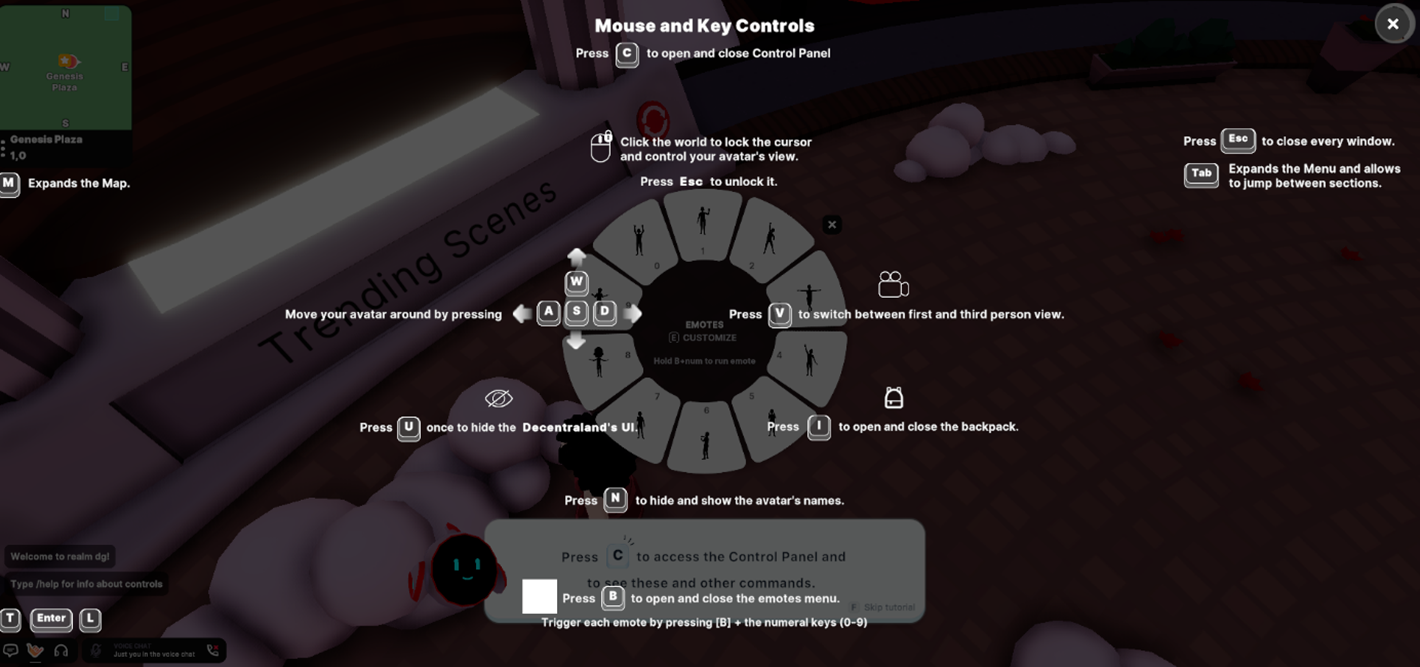
The metaverse is more than a game, a website, an application or a platform. It has become the interface through which we experience a new type of reality with its own rules and economy.
The "Metaverse" has become the trend recently with the emergence of the word "meta". Ever since, we see companies of all shapes and sizes entering the metaverse in different ways, including well-known brands like Walmart, Samsung, Nike, Adidas, and Gucci, ... However, some argue that the metaverse, in the true sense of the word, does not exist yet. And so we ask: what is the Metaverse, what kind of experience can we have in it, will it be the next digital revolution and how did we get there ?
What is the Metaverse? A concept that is still rather ambiguous but evolving very quickly
The metaverse is a convergence of our physical and digital or virtual lives, creating a virtual community where we can work, play, relax, transact and socialize. In other words, in its latest version, the metaverse now refers to a large-scale virtual fusion of video games, social networks, and entertainment creating new immersive experiences for users.
The metaverse is still in its early stages and the components of the metaverse continue to evolve rapidly. As such, there is still no single, compelling definition that people can refer to. There is much debate about what it could be, what it isn't, what it should be, or what it entails ... Snap’s CEO prefers not to use the word "Metaverse" as he believes that if several people were asked to define the word, each would have their own definition of the concept.[1]
In addition, each player proposes a different definition corresponding to its position as well as the experiences proposed in its "metaverse-type" platform. Each platform has a specific target population defining the services and content it offers. However, over the last few months, we have seen an increase in the crossover between the different services. A traditional (non-blockchain) platform focused on gaming, entertainment and socialization may tomorrow evolve into education and work services (Roblox) or a collaboration platform for beginners may also decide to become "an open and free metaverse for cultural events and will allow users to host NFT exhibitions" (Spatial).
What immersive experiences can be found now and in the future in the metaverse?
Gaming
One of the important things to know is that gaming is one of the key elements of the metaverse. If you look at the development timeline of the metaverse, it has grown out of two decades of gaming and has been and will be built on gaming infrastructure:

Source: The Metaverse Timeline, Jane Chen & Ole Heine
Major players such as Meta and Microsoft are trying to expand further by building on existing virtual gaming or by acquiring virtual gaming platforms. Thus, gaming is a must-have and will be one of the first experiences to be developed by each player who wants to create his/her own metaverse platform. Bloomberg intelligence has predicted that gaming – including AR/VR hardware, software, services, and advertising – will account for more than half of the value generated by the metaverse in 20242.
Entertainment
In recent months, during lockdown, virtual concerts of Justin Bieber, Ariana Grande, Snoop Dogg, and other stars in gaming platforms such as Fornite, Sandbox had great success. One could imagine that this experience will not only be for events, but will also open up other entertainment activities such as cinema, tourism, sports, etc.
Retail
As an open platform, the metaverse could eventually host all the brands and services that consumers interact with on a daily basis by having immersive virtual shopping experiences. Rather than visiting a website to browse 2D versions of products, users could see these items in 3D before deciding whether or not to make a purchase.
Other experiences
The metaverse will also create new modes of social interaction, education, and collaboration. Other applications that are very specific and for the moment not combined with other services exist in real estate and utilities.
Will the Metaverse become "The internet of the future" as stated in the promises and advertisements of big players?
The need for a more advanced version of the internet is growing, and companies are realizing that focusing on the metaverse for their business strategy could lead to a promising revenue stream. The metaverse is more than a game, a website, an application or a platform. It has become the interface through which we experience a new type of reality with its own rules and economy.
Therefore, the metaverse should produce the same diversity of opportunities that we have seen with the Web: new companies, products and services will emerge to handle everything from payment processing to identity verification, hiring, ad serving, content creation, security, ...
However, to get to that point, and to become a successor to the web, another question arises: In the future, can the metaverse have a larger target population? Will these people spend more time in this virtual world?
In order to become the "internet of the future", the Metaverse should have the following three key drivers:
Ability to Create a Ground for Content Creativity
Meta, Microsoft, Huawei and digital giants are partnering to define the standards of the metaverse. We do not know the standards of tomorrow yet, but these should be conducive to the growth of content creation. In other words, the success of a platform strongly depends on the ability to create an open environment for the co-construction of content. Indeed, the secret behind the success of gaming platforms such as Roblox, Minecraft as well as TikTok and Youtube is the creation of content by and for users. The more popular the platform becomes, the more creators/developers are attracted to it, and with more creators comes more content and then followers increase...
Devices and Ease of Use
While a metaverse doesn't have to provide virtual reality functionality, people overwhelmingly expect it to do so over time. While widespread adoption will take time and there will likely be challenges, we believe that XR technology will become "the next big computing platform." In order to reach the general public, device vendors need to be able to offer AR/VR glasses models that are more user-friendly, lighter, affordable and reduce the "Motion Sickness" phenomenon initially a big concern in the market. We will soon be witnessing the launch of Apple's VR headsets whilst many other players such as Meta, Nreal, Google, Docomo and Sony are planning the development of new, more compact and affordable models.
In addition, one of the important elements that will help platforms reach a wider population is their ease of use. Nowadays, most Metaverse platforms are based on the experience and culture of video games with a lot of keyboard shortcuts to move around in the 3D game system. Although GenZ will be the primary target of the Metaverse, non-gamers from Y and Z generations (Millennials) will also need time to get used to this new world; one could imagine the difficulty encountered by older generations or people less aware of new technologies.

Sofrecom découvre Decentraland
Source : Decentraland
Enhanced Security to Gain User Trust
The metaverse will make many of the difficult issues of today's digital existence more sensitive, such as data rights and security, misinformation and radicalization, platform power, and user health. Big brands will have a strong incentive to ensure that their virtual worlds are safe and trustworthy, which telecom operators could add significant value to, more than "a step change in the capabilities of telecoms networks," as Dan Rabinovitsj, Vice President of Meta Connectivity[1], says.
Brands and major digital players including operators have the opportunity today to explore the possibilities of the new metaverse territory, seeking to understand the needs and expectations of young people, especially Generation Z and younger, who will be the first to adopt the metaverse.
Read more about Where do telecom operators fall in the metaverse puzzle?
[1] https://www.businessinsider.com/snap-ceo-evan-spiegel-metaverse-ambiguous-hypothetical-facebook-meta-zuckerberg-2022-4?r=US&IR=T
[2] https://www.bloomberg.com/professional/blog/the-metaverse-is-already-now-four-surprising-bi-charts/
[3] https://www.cnbc.com/2022/03/02/meta-says-todays-cellular-networks-arent-ready-for-the-metaverse.html






